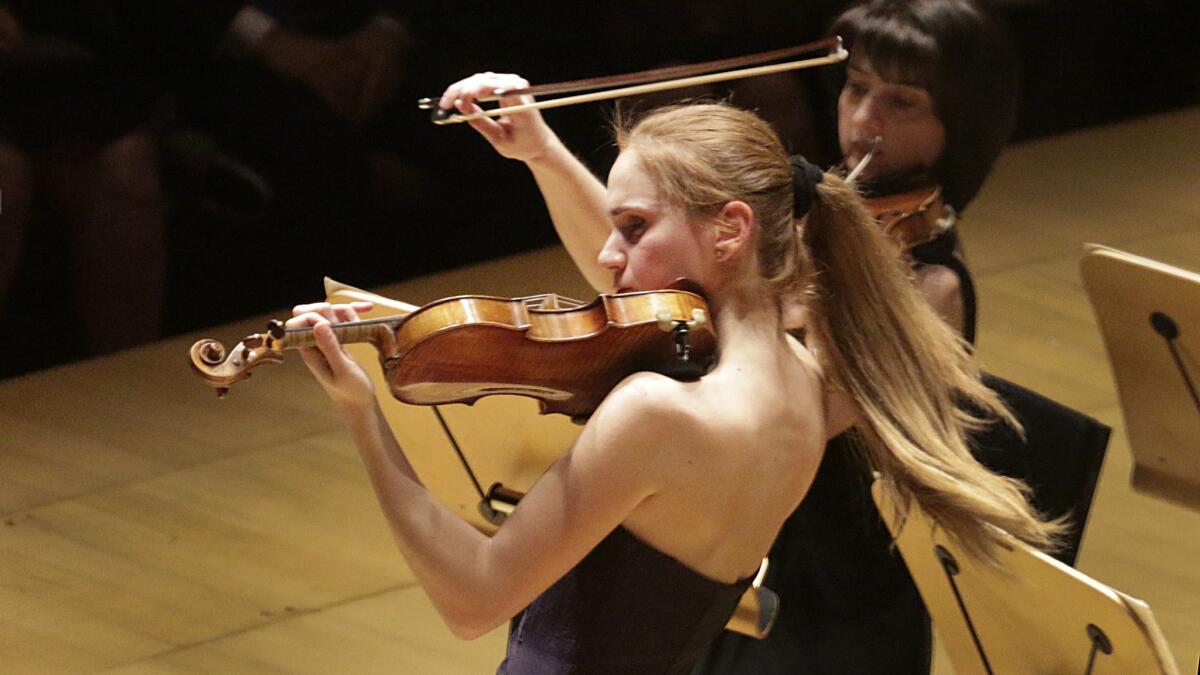Review: An eloquent remembrance by Armenian National Philharmonic

Anush Nikoghosyan’s hair gets into the act during her violin solo with the Armenian National Philharmonic Orchestra at Disney.
Armenia’s struggle for international acknowledgment that the extermination of more than a million Armenians by the Ottoman Empire during the First World War was genocide has been the work of historians and politicians. But it is also a job for art, especially with the recent 100th anniversary of the first deportations from Turkey.
On Tuesday, Armenia was awarded the Venice Biennale’s Golden Lion for best national pavilion, “Armenity,” which addresses the Armenian diaspora. Armenia is also a musical nation, and on Tuesday, the Armenian National Philharmonic Orchestra made its first appearance in Walt Disney Concert Hall with “A Concert of Remembrance.”
Founded in Armenia’s capital of Yerevan 90 years ago, shortly after the country was incorporated into the Soviet Union, the orchestra had the reputation as a solid Soviet band while still maintaining its spirited national identity.
Nearly all of its artistic directors and principal conductors, as well as its players, have been and continue to be Armenian. An important exception was the twentysomething Valery Gergiev, who led the orchestra in the early 1980s.
The Disney Hall program, conducted by Eduard Topchjan (artistic director and principal conductor since 2000), represented both the orchestra’s Armenian and Soviet heritage. Splashy potboilers — the most popular numbers from Khachaturian’s ballet “Spartacus” and Shostakovich’s Fifth Symphony — opened and closed the concert.
It was a notably less ambitious, or commemorative, occasion than the imaginative and comprehensive all-Armenian gala program given last week in Washington, D.C., the orchestra’s only other U.S. stop on its first North American tour in 19 years.
But there was also Tigran Mansurian’s significantly somber Concerto for Violin and String Orchestra, featuring an eloquent young soloist, Anush Nikoghosyan. The 76-year-old composer, who divides his time between Yerevan and Glendale, represents both to his country, where he is a national figure, and the international music community, the soul of Armenia.
Like much of Mansurian’s work, this 1981 violin concerto is interior music. The orchestra is small, only 18 strings. There is an underlying quality of dirge. Melodies are made of few notes, but they are so intensely beautiful that they seem to capture the very essence of beauty. The tempo is always slow. For much of nearly 30 minutes, the dynamics remain ethereally soft, except for explosions of shocking anger, which are breathtaking in their violence.
As far as can be determined, this was the first time any of Mansurian’s music, a mainstay of the Dilijan chamber music series at the Colburn School across the street, has been played at Disney. It is a perfect venue for it, but a half-hour of demandingly serious music between showpieces was not a good idea for an antsy, gregarious crowd, which added a percussion section of shuffled feet and coughing.
The orchestra, on the other hand, does not give a gregarious impression. Topchjan, who led the program without scores, is an unsmiling, serious, commanding conductor. His orchestra is a serious, stony-faced group as well. Not a single player broke a hint of a smile, even when showered with enthusiastic bravos and whistles.
The seriousness did help, though, with Khachaturian. A sugary Adagio was tart and grand. Spartacus’ garish victory music was stern and compelling.
The debate continues about what Shostakovich meant with his 1937 Fifth Symphony, whether the composer acted as a sop to Stalin or employed surreptitiously dissident context to harmonic consonances. Topchjan’s approach suggested the latter.
There were few sweet sounds. The strings produced a Russian bite. The winds avoided mellowness. Brass could be edgy. Climaxes were permitted to hurt ears. The orchestra did produce some surprising humor in a drunken rendition of the Allegretto, but that vanished with an intently sorrowful slow movement. Shostakovich’s bombastic victory march at the end had the character of tanks not stopping for man, woman or child.
The mournful encore was “Shushani” by Edvard Mirzoyan, chosen to commemorate the late composer’s 94th birthday Tuesday. The audience had the last word when cheers, which sounded more celebratory than impatient, interrupted Mirzoyan’s quiet close.
Twitter: @markswed
More to Read
The biggest entertainment stories
Get our big stories about Hollywood, film, television, music, arts, culture and more right in your inbox as soon as they publish.
You may occasionally receive promotional content from the Los Angeles Times.











